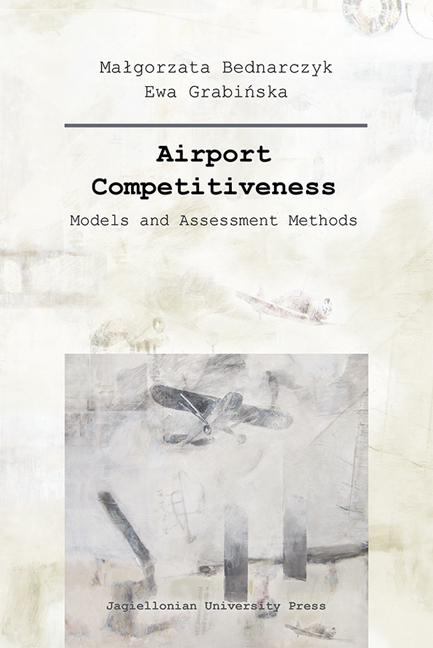Book contents
- Frontmatter
- Contents
- List of Common Abbreviations
- Dedication
- Introduction
- 1 The Essence of Air Transport and its Socio-Economic Role
- 2 Significance of Competitiveness in Air Transportation
- 3 Foundations for Assessing Competitiveness of an Airport
- 4 External and Internal Determinants of Regional Airport Competitiveness
- 5 Competitiveness Model of a Regional Airport
- Conclusions
- List of Tables and Figures, Drawings and Graphs
- Literature
- Appendix
- List of Graphs and Tables in the Appendix
2 - Significance of Competitiveness in Air Transportation
Published online by Cambridge University Press: 10 January 2018
- Frontmatter
- Contents
- List of Common Abbreviations
- Dedication
- Introduction
- 1 The Essence of Air Transport and its Socio-Economic Role
- 2 Significance of Competitiveness in Air Transportation
- 3 Foundations for Assessing Competitiveness of an Airport
- 4 External and Internal Determinants of Regional Airport Competitiveness
- 5 Competitiveness Model of a Regional Airport
- Conclusions
- List of Tables and Figures, Drawings and Graphs
- Literature
- Appendix
- List of Graphs and Tables in the Appendix
Summary
A condition necessary for competition to exist as an economic phenomenon is a free-market economy. Competition itself creates foundation for market processes. It also regulates the behaviour of all entities existing on the market. For that reason, the phenomenon of competition, as well as the notion of competitiveness cannot be a subject of research and analysis separately from the market, for they are closely connected with all factors, which create and model free-market structures. The way in which competitiveness is seen evolves constantly, especially when reality of economic, political or social life is taken into consideration. In this part of the monograph, the essential concept of companies’ competitiveness and its basic dimensions are presented. Moreover, the significance of companies’ competitiveness in the specific context of air transportation service sector is outlined.
The notion and essence of enterprises’ competitiveness
Concepts of enterprises’ competitiveness
The term ‘competitiveness’ is quite a complex notion. More and more attention is being paid to it in scientific research. However, it is neither understood nor interpreted unequivocally. One result of research into competitiveness is an array of totally different definitions of the notion in question.46 Competitiveness of a product, company, branch, sector, economy, or region is defined. The notion of ‘competitiveness’ can thus be used with respect to companies, sectors, regions, nations (countries), and also supranational organisations. In professional literature, an evolution of the notion can be seen, starting with a traditional concept, focusing mainly on the role of tangible assets as competitiveness-determining factors, to a more complex approach, where competitiveness is being determined with a wide variety of factors associated with macro-, meso- and micro- determinants of a company's environment. Therefore, despite the fact that there are many definitions of competitiveness, starting with traditional (cost-based) concepts to more developed (systemic) concepts, it can be assumed that competitiveness is about the ability to compete, in other words, to operate and survive in a competitive surrounding.48 Competitiveness of a company means that it is capable to compete, or to participate in a market game, relying on skills to compose factors of its competitiveness potential.
- Type
- Chapter
- Information
- Airport CompetitivnessModels and Assessment Methods, pp. 35 - 58Publisher: Jagiellonian University PressPrint publication year: 2015

